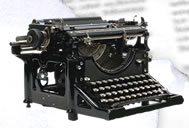Blacklisted Hollywood screenwriter Dalton Trumbo (1905 1976) did not do himself any favors when he wrote the attached essay outlining his sympathies for Stalin's Soviet Union at the expense of the United States. A year later he would find himself in the hot-seat in front of the House Un-American Activities Committee (1938 - 1975) where his non-cooperation landed him eleven months in the hoosegow on contempt of Congress charges.
In 1887 the New York Times reviewed the first English edition of Das Kapital by Karl Marx, click here to read it...
Months after his appearance as a spectator at the House Committee on Un-American Activities, actor Humphrey Bogart wrote this article for the editors of
Photoplay Magazine addressing the topic of communist infiltration in the Hollywood film industry:
"In the final analysis, this House Committee probe has had one salutary effect. It has cleared the air by indicating what a minute number of Commies there really are in the film industry. Though headlines may have screamed of the Red menace in the movies, all the wind and the fury actually proved that there's been no Communism injected on American movie screens."
Despite the catchy title, Novelist James M. Cain, did not even attempt to answer the question as to how lousy Hollywood was with dirty Reds, however he did spell out that there were enough of them in the industry to bring production to a halt, if they ever cared to do so. Cain's article encourages both the executive class and the pinko-wordsmiths to walk the middle path and keep the cameras rolling.
Click here to read a review of James M. Cain's novel, "The Butterfly".
The years 1947 and 1948 was a rough patch for Hollywood - and journalist James Felton did a favor for all those geeky film historians yet unborn for documenting their myriad travails in the attached article. Aside from a major drop in box-office receipts, the most time consuming inconvenience involved U.S. Representative J. Parnell Thomas (1895 1970) and his cursed House Committee on Un-American Activities (HUAC) that threatened to reduce their profits to a further degree.
Karen Morley (né Mildred Linton: 1909 2003) was an American movie actress whose last moment before the cameras was when she refused to testify before the House Un-American Activities Committee during the early Winter of 1952.
Larry Parks (1914 1975) was an Hollywood movie actor. His career arched from bit player and supporting roles to top billing before his career was virtually ended when he admitted to having once been a member of the Communist Party USA; his candor soon led to his being blacklisted by all the Hollywood studios.
It seems so odd that that the House Un-American Activities Committee that convened to examine the communist influence in the Hollywood motion picture industry lasted only nine days - yet it is one of the most well-known of all the Congressional committees in the history of the republic. That said, we have posted one journalist's summary of all the hearings:
"Former investigations of this kind were mainly concerned with what people had done or not done; this investigation set a precedent by being concerned about what people thought."
American political parties have not been the only folks to visit Beverly Hills - hat-in-hand; Soviet-backed Reds have done it, too. This 1940 article goes into some detail explaining all the various false fronts that American Communists would erect in order to attract Hollywood's empathetic pretty boys - a tribe that is so easily separated from their wealth. Once an actor was hooked, they were steadily relied upon by the Reds to cough-up the do-re-mi without question; if they didn't - they got the works.
"Walter Winchell has already passed on to Washington documentary evidence proving that thousands of dollars contributed by Hollywood to innocent-sounding organizations eventually wound up in the hands of Communist leaders. Police and other investigatory groups have gone about accumulating evidence of the conspiracy."
One of the many Communist-front advocacy groups that milked Hollywood of much of its wealth was called the"Independent Citizen's Committee of the Arts, Sciences and Professions"; actress Olivia de Havilland was one of their willing dupes until she worked with the FBI and helped to bring them down.
